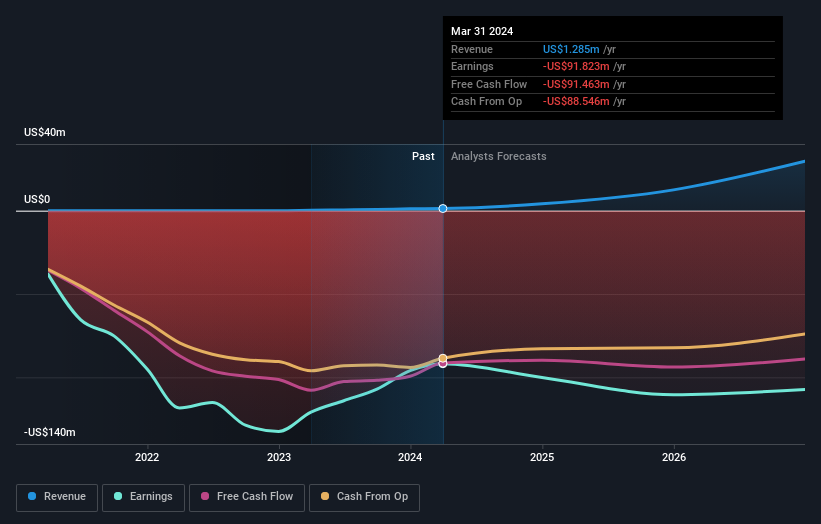Stock Analysis
- United States
- /
- Life Sciences
- /
- NasdaqGM:QSI
Painful week for retail investors invested in Quantum-Si incorporated (NASDAQ:QSI) after 11% drop, institutions also suffered losses

Key Insights
- Significant control over Quantum-Si by retail investors implies that the general public has more power to influence management and governance-related decisions
- The top 6 shareholders own 52% of the company
- Insiders have been buying lately
If you want to know who really controls Quantum-Si incorporated (NASDAQ:QSI), then you'll have to look at the makeup of its share registry. We can see that retail investors own the lion's share in the company with 39% ownership. In other words, the group stands to gain the most (or lose the most) from their investment into the company.
While institutions, who own 34% shares weren’t spared from last week’s US$28m market cap drop, retail investors as a group suffered the maximum losses
In the chart below, we zoom in on the different ownership groups of Quantum-Si.
See our latest analysis for Quantum-Si

What Does The Institutional Ownership Tell Us About Quantum-Si?
Many institutions measure their performance against an index that approximates the local market. So they usually pay more attention to companies that are included in major indices.
Quantum-Si already has institutions on the share registry. Indeed, they own a respectable stake in the company. This suggests some credibility amongst professional investors. But we can't rely on that fact alone since institutions make bad investments sometimes, just like everyone does. When multiple institutions own a stock, there's always a risk that they are in a 'crowded trade'. When such a trade goes wrong, multiple parties may compete to sell stock fast. This risk is higher in a company without a history of growth. You can see Quantum-Si's historic earnings and revenue below, but keep in mind there's always more to the story.

We note that hedge funds don't have a meaningful investment in Quantum-Si. Because actions speak louder than words, we consider it a good sign when insiders own a significant stake in a company. In Quantum-Si's case, its Top Key Executive, Jonathan Rothberg, is the largest shareholder, holding 26% of shares outstanding. ARK Investment Management LLC is the second largest shareholder owning 9.0% of common stock, and Nikko Asset Management Co., Ltd. holds about 5.7% of the company stock.
We also observed that the top 6 shareholders account for more than half of the share register, with a few smaller shareholders to balance the interests of the larger ones to a certain extent.
Researching institutional ownership is a good way to gauge and filter a stock's expected performance. The same can be achieved by studying analyst sentiments. There is some analyst coverage of the stock, but it could still become more well known, with time.
Insider Ownership Of Quantum-Si
The definition of company insiders can be subjective and does vary between jurisdictions. Our data reflects individual insiders, capturing board members at the very least. The company management answer to the board and the latter should represent the interests of shareholders. Notably, sometimes top-level managers are on the board themselves.
Most consider insider ownership a positive because it can indicate the board is well aligned with other shareholders. However, on some occasions too much power is concentrated within this group.
Our most recent data indicates that insiders own a reasonable proportion of Quantum-Si incorporated. It has a market capitalization of just US$250m, and insiders have US$68m worth of shares in their own names. This may suggest that the founders still own a lot of shares. You can click here to see if they have been buying or selling.
General Public Ownership
With a 39% ownership, the general public, mostly comprising of individual investors, have some degree of sway over Quantum-Si. While this group can't necessarily call the shots, it can certainly have a real influence on how the company is run.
Next Steps:
It's always worth thinking about the different groups who own shares in a company. But to understand Quantum-Si better, we need to consider many other factors. Consider for instance, the ever-present spectre of investment risk. We've identified 3 warning signs with Quantum-Si , and understanding them should be part of your investment process.
But ultimately it is the future, not the past, that will determine how well the owners of this business will do. Therefore we think it advisable to take a look at this free report showing whether analysts are predicting a brighter future.
NB: Figures in this article are calculated using data from the last twelve months, which refer to the 12-month period ending on the last date of the month the financial statement is dated. This may not be consistent with full year annual report figures.
Valuation is complex, but we're helping make it simple.
Find out whether Quantum-Si is potentially over or undervalued by checking out our comprehensive analysis, which includes fair value estimates, risks and warnings, dividends, insider transactions and financial health.
View the Free AnalysisHave feedback on this article? Concerned about the content? Get in touch with us directly. Alternatively, email editorial-team (at) simplywallst.com.
This article by Simply Wall St is general in nature. We provide commentary based on historical data and analyst forecasts only using an unbiased methodology and our articles are not intended to be financial advice. It does not constitute a recommendation to buy or sell any stock, and does not take account of your objectives, or your financial situation. We aim to bring you long-term focused analysis driven by fundamental data. Note that our analysis may not factor in the latest price-sensitive company announcements or qualitative material. Simply Wall St has no position in any stocks mentioned.
About NasdaqGM:QSI
Quantum-Si
A life sciences company, engages in the development of single-molecule detection platform to enable Next Generation Protein Sequencing (NGPS).
Flawless balance sheet and slightly overvalued.

